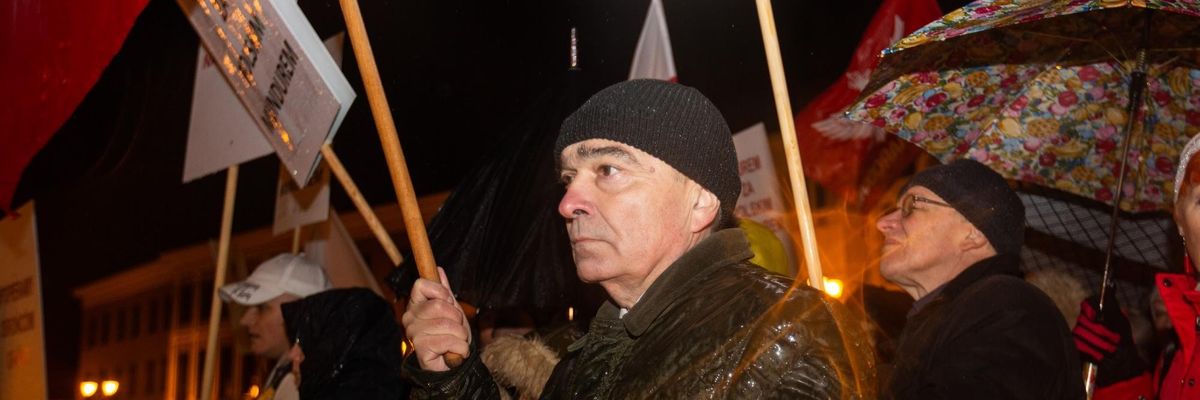WARSAW, POLAND — While the crisis on the EU-Belarus border is a humanitarian disaster, it is not the hybrid attack on Europe that it is being made out to be, experts say.
Since August, Belarusian dictator Alexander Lukashenko has been trying to gain leverage on the EU by making migrant passage on Belarus’s border with Poland easier and occasionally facilitating it. Warsaw, in turn, has reacted to the humanitarian crisis by using it as an excuse to militarize the situation and conjure up the possibility of a joint Russo-Belarusian offensive. This has only ramped up tensions in the region and continued a trend of a NATO member imagining an anti-Western threat where there isn’t one.
The migrants were weaponized by Minsk, with Lukashenko openly threatening the EU with a “flood” of migrants and drugs in the wake of his brutal crackdown on the peaceful electoral protests of 2020. Starting from this August, Lukashenko set out to do just that, providing visas and assistance in crossing the border.
In Poland the migrants are often not perceived as legitimate. Robert Winnicki, a Polish nationalist parliamentarian, was interviewed by Responsible Statecraft during an anti-migrant rally in the border town of Bialystok. “They are not refugees, they are economic migrants, pure and simple,” said Winnicki.
But the migrants, who are routinely brutalized by both Polish and Belarusian border guards, are often fleeing war or are looking for medical treatment for their children. They mostly come from the Middle East region and are mostly Kurdish. It seems that most of them are seeking a better life in Germany and only see Poland as a transit point. Responsible Statecraft spoke to a Kurdish asylum seeker in a camp in Poland who said. “Poland, okay, but I want Germany,” adding that he is trying to find a better environment for his autistic child.
But Warsaw sees the asylum seekers as tools of Russian “hybrid warfare.” Poland’s prime minister, Mateusz Morawiecki, recently released a well-produced montage video in which he claimed Poland is “defending Europe” against a “hybrid war” waged by Lukashenko and Russian President Vladimir Putin. Morawiecki gave no evidence of Russia's involvement on the border. The video claims that this is “no ordinary migration crisis” and the beginning of an anti-European offensive. His video did not once mention the rights of asylum seekers.
These concerns of a hybrid war end up dehumanizing asylum seekers and justifying brutality on the border. Indeed, Polish soldiers routinely harass journalists and aid workers. They also push asylum seekers back into Belarus, which is illegal under EU human rights law.
On the border with Belarus, Polish soldiers have deployed tear gas and water cannons in freezing temperatures. As a result, migrants who do make it into Poland aim to pass unnoticed and often die from freezing temperatures and exhaustion. At least 13 have already died. Dr. Karolina Follis, a senior lecturer at Lancaster University and a specialist on borders and human rights, told Responsible Statecraft that “the asylum seekers are dehumanized, always referred to as ‘migrants’ not ‘asylum seekers’ or ‘refugees.’”
Experts also say that Warsaw is overstating the threat of a “hybrid attack.”
Julie Newton, a research fellow at the University of Oxford, told Responsible Statecraft that Lukashenko was always a “thorn in Putin’s side.” Indeed, the wayward Belarusian leader has spent over two decades maneuvering between East and West, often angering the Kremlin.
Dmitry Suslov, a prominent Russian political scientist who serves as the deputy director at Moscow’s Center for Comprehensive European and International Studies, believes that Lukashenko’s motivation is status-driven, rather than commanded by the Kremlin. He argued that Lukashenko wants “dialogue and recognition from European leaders, and so far he has been getting it.” Indeed, after a phone call with then-German Chancellor Angela Merkel last month, Lukashenko moved most of the refugees into a “logistical center” away from the border.
Kacper Wanczyk, a former Polish diplomat in Minsk and a current fellow at the University of Warsaw, said the migrants present “no threat” from a security perspective. Wanczyk believes that the asylum seekers on the border should be “processed in accordance with EU human rights law and not routinely brutalized.”
Artyom Shraibman, a top Belarusian analyst and founder of Sense Analytics, told Responsible Statecraft that while “Putin is certainly happy about what is happening on the border… it is unlikely that in private Putin and Lukashenko are cooperating on this.”
Aside from heightening international tensions, Warsaw also seems to have used the crisis to strengthen the ruling party. As Karolina Follis told Responsible Statecraft, “the Law and Justice party came to power using xenophobic rhethoric in the wake of the 2015 ‘migration crisis,’ and this crisis is a perfect opportunity for them.”
Currently, Poland’s Law and Justice Party is in the middle of what some call a takeover of Polish courts, putting the legitimacy of Polish democracy in question. The migrant crisis, critics say, has been an opportunity for the party to distract Europe from charges of democratic backsliding using the phantom threat of a “hybrid war” with Russia.
The situation on the EU-Belarusian border has also raised concerns about a NATO country raising tensions at a time when U.S.-Russian relations have deteriorated.
Anatol Lieven, senior research fellow on Russia and Europe at the Quincy Institute for Responsible Statecraft, pointed out that “the use of the word ‘war’ to describe various forms of non-violent pressure is a deliberate attempt at threat inflation and stirring up fear in Western elites and publics — with some success, alas.”
Lieven also noted that “the EU and NATO clearly must resist [Belarusian] pressure. But they also need to recognize [that] if you publicly declare your intention of helping to overthrow a regime, that regime will retaliate by whatever means are at its disposal. Western governments need to think about this before they launch regime change strategies.”














